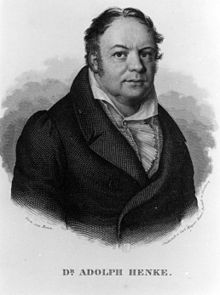Adolph Henke
Adolph Christian Heinrich Henke (born April 13, 1775 in Braunschweig , † August 8, 1843 in Erlangen ) was professor of physiology, pathology and state medicine in Erlangen.
He was one of the first forensic doctors in German-speaking countries, but according to his colleague in Berlin, Johann Ludwig Casper, he had never opened a judicial body.
Life
Adolph Henke was the sixth son of the pastor and garrison preacher Ludwig Henke (1736–1785) and Wilhelmine Henke, b. Spohr (1744-1806). One brother was the secret counselor Eduard Henke .
In 1791 Adolph Henke studied first theology at the Collegium Carolinum in Braunschweig, soon afterwards medicine and moved to the University of Helmstedt , 1798/99 to Göttingen and received his doctorate in 1799 in Helmstedt. In 1802 he established himself as a general practitioner in Braunschweig. In 1805 he received a call to an extraordinary professorship for pathology at the University of Erlangen . In 1809 he gave the first lecture on Medicina forensis, the beginning of the field of forensic medicine. In 1812 he published the first edition of his main work: Textbook of Forensic Medicine (in 1841 the 10th edition of this work was published by Henke himself). In 1815 he became full professor for physiology, pathology and state medicine in Erlangen. In 1818 he was elected a member of the Leopoldina . Henke was prorector of the University of Erlangen several times and was appointed court advisor in 1821. In 1836, Henke fell ill with a chronic liver disease and died in 1843.
Since 1810 Henke was married to Sophie Henke, b. Oertel (1793–1846), they had eight children, four of whom died early. His second daughter Rosalie (1813–1894) married the professor of zoology, physiology and anatomy Rudolf Wagner (1805–1864), who had studied with his future father-in-law and who wrote the biographical sketch of the memories of Adolph Henke.
Quote
- the last paragraph from the memories reads:
Henke was tall and imposing; his awe-inspiring personality and his seriously mild, at the same time undemanding measure, removed every unworthy word and being around him. An enemy of all Heimlichthuns, all falsification and gossip, he opposed everyone openly and decisively, but always in a fine, noble manner. Not a rude word was heard from his mouth. He helped where he could, was cheap and benevolent, even friendly.
Fonts
- 1799 "de opii vi medicatrice et usu" (dissertation)
- 1801–1836 as editors with Christian Friedrich Nasse , Ernst Horn and Wagner : Archive for medical experience. Journal (66 volumes plus Univ.-Reg.), Rein / (from volume 3 :) Rücker, Leipzig / Berlin 1801–1836 (year 1809–1831 also: Archive for Practical Medicine and Clinic ).
- 1806 on the vitality of blood and primary juice diseases (inaugural letter)
- 1806–1808 Manual of general and special pathology (3 volumes)
- 1809 Handbook for the knowledge and healing of teething troubles
- 1811 paperback for mothers
- 1811 Revision of the doctrine of the lung and breath test
- 1812 textbook of forensic medicine
- 1813/14 representation of the campaigns of the allies against Napoleon (without mentioning his own name)
- 1814 About the developments and developmental diseases of the human organism
- 1815–1834 treatises in the field of forensic medicine (5 volumes)
- 1821–1843 Journal for State Medicines
literature
- Karl von Hecker : Henke, Christ. Heinr. Adolph . In: Allgemeine Deutsche Biographie (ADB). Volume 11, Duncker & Humblot, Leipzig 1880, pp. 751-753.
Web links
- Works by and about Adolph Henke in the German Digital Library
- Entry on Adolph Henke in Kalliope
- Entry about Adolph Henke in the digital portrait index
Individual evidence
- ↑ Wolfgang Schwerd: On the history of forensic medicine. In: Wolfgang Schwerd (Hrsg.): Brief textbook of forensic medicine for doctors and lawyers. Deutscher Ärzte-Verlag, Cologne-Lövenich, 3rd, revised and expanded edition 1979, ISBN 3-7691-0050-6 , p. 351.
| personal data | |
|---|---|
| SURNAME | Henke, Adolph |
| ALTERNATIVE NAMES | Henke, Adolph Christian Heinrich |
| BRIEF DESCRIPTION | Founder of forensic medicine, university professor for physiology, pathology and state medicine in Erlangen |
| DATE OF BIRTH | April 13, 1775 |
| PLACE OF BIRTH | Braunschweig |
| DATE OF DEATH | August 8, 1843 |
| Place of death | gain |
